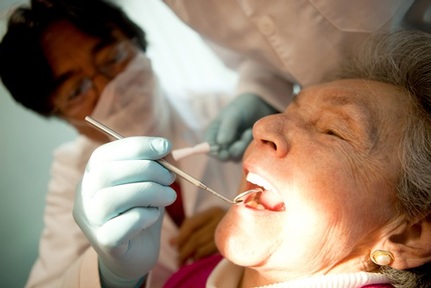Millions of older people have an 'urgent' dental problem, warn dentists
At least 1.8 million people aged 65 and over across England, Wales and Northern Ireland have an urgent dental condition, which could rise by more than 50 per cent by 2040, new research suggests.

In a report published by The Faculty of Dental Surgery at the Royal College of Surgeons, dentists have raised concerns about the impact conditions such as dental pain, oral sepsis and extensive tooth decay are having on older people's quality of life.
The Faculty is calling for health and social care professionals to receive training in oral health, and for regulators to make standards of oral care part of their assessments of hospitals and care homes.
Professor Michael Escudier, dean of the Faculty of Dental Surgery at the Royal College of Surgeons, said: "Many of us know what it’s like to have excruciating tooth or gum pain. It puts you off your food and makes it difficult to do daily tasks. For older people, the effects are even worse. It can be very isolating, making people reluctant to socialise with friends and family, and will have a significant impact on their quality of life.
"As well as causing pain and making it difficult to speak, eat and take medication, poor oral health is linked to conditions in older people such as malnutrition and aspiration pneumonia.
"We are letting older people down at a time when they need the most help by not having a joined-up strategy for improving access to dental services for older people."
Improved oral healthcare
Standards of adult oral health have improved significantly over the last 40 years. While just 22 per cent of people in England aged 65 and over retained some of their natural teeth in 1978, by 2009 this had increased to 85 per cent of 65 to 74-year-olds and 67 per cent of those aged 75 and over.
However, this also creates new challenges for dentists, as many older people now require ongoing maintenance of restored teeth.
Last year the National Institute for Health and Care Excellence (NICE) released new guidance on oral health for adults in care homes. While this guidance specifically concerns oral health for those in residential care, the Faculty believes it should be used as a benchmark for all types of care provision.
The report makes a number of recommendations to improve oral healthcare for older people. They include:
• Preventative advice on maintaining good oral health should be easily available for older people themselves, their families and their carers
• Health and social care regulators should ensure that standards of oral care are assessed during their inspections of care homes and hospitals
• All hospitals and care homes should have policies in place to minimise denture loss. These should include checking whether a patient has dentures on admission, and ensuring that staff always check for dentures when disposing of food trays and changing bed linen.
Oral health should be a priority
Andrew Kaye, head of policy at Independent Age, said: "Maintaining good oral health is a crucial part of any older person’s overall health and wellbeing and there should be no reason why it gets treated as anything other than a priority.
"The finding that 1.8 million older people have an urgent dental problem is truly shocking. There needs to be a significant step-change in the way health and care services view oral health. This is partly about helping individuals who rely on dentures, but there need to be other improvements too.
"With such large growth in the numbers of older people needing dental services, we need to see better preventative advice on maintaining oral health, and strong regulation of hospitals and care homes to ensure that standards on oral health are being complied with and adhered to."
For more information on the NICE guidance on oral healthcare visit: https://www.nice.org.uk/guidance/ng48
Latest News
 29-Jul-24
Dementia Bus gives carehome.co.uk staff insight into life with dementia
29-Jul-24
Dementia Bus gives carehome.co.uk staff insight into life with dementia
 01-Mar-24
Find out the top care homes in 2024
01-Mar-24
Find out the top care homes in 2024
 21-Mar-23
UK's top care homes in 2023 revealed
21-Mar-23
UK's top care homes in 2023 revealed
 03-Jan-23
carehome.co.uk launches free care helpline
03-Jan-23
carehome.co.uk launches free care helpline
 13-Dec-22
5 mins with Emily Whitehurst, chief operating officer for Constantia Healthcare
13-Dec-22
5 mins with Emily Whitehurst, chief operating officer for Constantia Healthcare